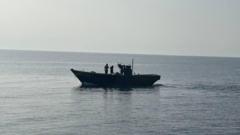South Korea has repatriated six North Koreans who unintentionally crossed into South Korean waters, with all individuals expressing a strong desire to return home, according to the Ministry of Unification. Two of these North Koreans had been in the South since March, marking the longest stay recorded for individuals seeking to return, while the remaining four were sailors who drifted into southern waters in May.
This incident marks the first such repatriation under President Lee Jae-myung, who assumed office with a mandate to foster better relations between the two Koreas. However, efforts to coordinate the return spanned several months without success. Accidental crossings by North Koreans into the South are not uncommon, often due to the use of small, wooden boats that are difficult to navigate back to their original course.
In previous instances, the two Koreas would coordinate returns through the land border, but tensions escalated in April 2023 when Pyongyang severed all inter-Korean communication lines. In a recent statement, North Korean leader Kim Jong Un declared that reunification with the South was no longer a possibility. Despite attempts by South Korea to contact the North through the United Nations Command regarding the repatriation, they received no response.
Wednesday's handover saw North Korean patrol vessels and fishing boats present, leading some analysts to suggest that the two Koreas may have reached informal agreements for the return of the six individuals. According to Nam Sung-wook, former head of the Korea National Strategy Institute, once the six individuals are returned, they will likely face extensive interrogations about their experiences in the South and any sensitive information they might have encountered.
These individuals may eventually be urged to assist in propagating state ideology, further strengthening Kim's regime. Michael Madden, a North Korea specialist at the Stimson Center, highlighted the potential decision-making delays stemming from interim leadership in South Korea following the impeachment of former President Yoon Suk Yeol, indicating a lack of trust between the two governments.
Some North Korean defectors expressed disappointment regarding the repatriation, suggesting the six North Koreans should have been allowed to learn more about South Korean society prior to their return. Activist Lee Min-bok mentioned a desire to communicate knowledge about inter-Korean history and warn the individuals about potential repercussions from the North's regime for their brief exposure to life in the South.
Lee Jae-myung's administration expressed intentions to restart dialogue with Pyongyang while working to reduce tensions, including suspending military propaganda broadcasts across the border shortly after taking office. Nevertheless, some analysts remain skeptical about significant improvements in inter-Korean relations, citing North Korea's growing alliance with Russia and a general lack of public interest in engagement from South Korea. This raises concerns about the possibility of reestablishing effective communication channels between the North and South.




















